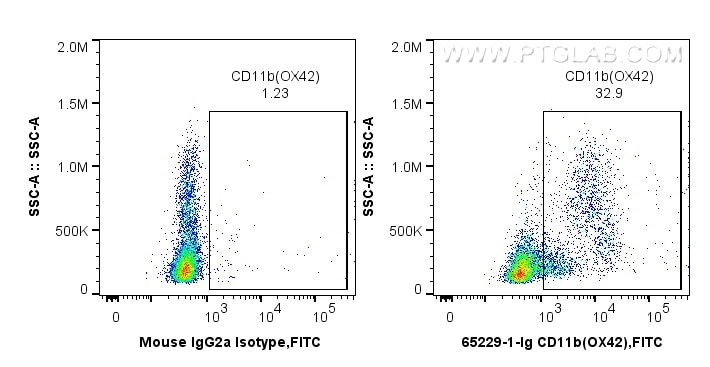CD11b/c Monoklonaler Antikörper
CD11b/c Monoklonal Antikörper für FC
Wirt / Isotyp
Maus / IgG2a, kappa
Getestete Reaktivität
Ratte
Anwendung
FC
Konjugation
Unkonjugiert
CloneNo.
OX42
Kat-Nr. : 65229-1-Ig
Synonyme
Geprüfte Anwendungen
| Erfolgreiche Detektion in FC | LOU rat splenocytes |
Empfohlene Verdünnung
| Anwendung | Verdünnung |
|---|---|
| This reagent has been tested for flow cytometric analysis. It is recommended that this reagent should be titrated in each testing system to obtain optimal results. | |
| Sample-dependent, check data in validation data gallery | |
Produktinformation
65229-1-Ig bindet in FC CD11b/c und zeigt Reaktivität mit Ratten
| Getestete Reaktivität | Ratte |
| Wirt / Isotyp | Maus / IgG2a, kappa |
| Klonalität | Monoklonal |
| Typ | Antikörper |
| Immunogen | Rat peritoneal macrophages |
| Vollständiger Name | integrin alpha M |
| Berechnetes Molekulargewicht | 127 kDa |
| GenBank-Zugangsnummer | NM_012711 |
| Gene symbol | CD11b |
| Gene ID (NCBI) | 25021 |
| Konjugation | Unkonjugiert |
| Form | Liquid |
| Reinigungsmethode | Affinitätsreinigung |
| Lagerungspuffer | PBS with 0.02% sodium azide and 50% glycerol |
| Lagerungsbedingungen | Store at 2-8°C. Stable for one year after shipment. |
Hintergrundinformationen
Integrins are cell adhesion receptors that are heterodimers composed of non-covalently associated α and β subunits (PMID: 9779984). CD11b (integrin alpha M or CR3A) and CD11c (integrin alpha X) are members of the integrin alpha chain family and can form α/β heterodimers with CD18 (integrin β2). CD11b/CD18 is a receptor for the complement protein fragment C3bi, and is also a receptor for fibrinogen, factor X, and ICAM1 (PMID: 2971974; 15485828). CD11c/CD18 acts as a receptor for fibrinogen and is important in monocyte adhesion and chemotaxis (PMID: 1671533). The OX-42 antibody recognizes a common epitope shared between CD11b and CD11c. It binds to C3bi receptor and is known to block C3bi binding (PMID: 3512425; 8449218).
Protokolle
| PRODUKTSPEZIFISCHE PROTOKOLLE | |
|---|---|
| FC protocol for CD11b/c antibody 65229-1-Ig | Download protocol |
| STANDARD-PROTOKOLLE | |
|---|---|
| Klicken Sie hier, um unsere Standardprotokolle anzuzeigen |


